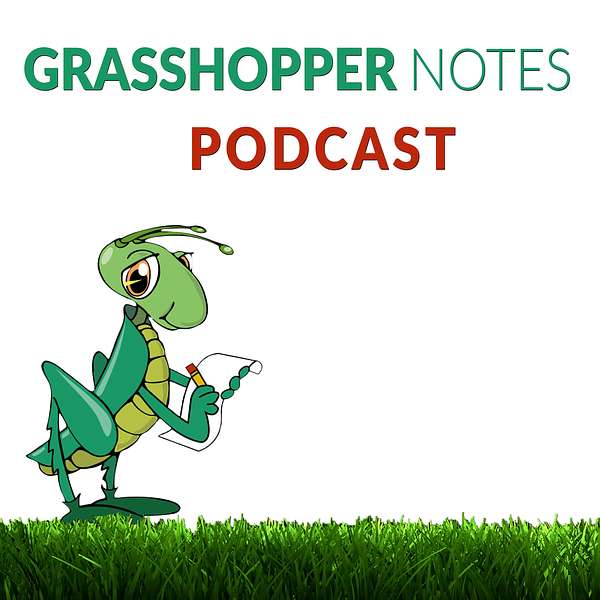
Grasshopper Notes Podcast
The Grasshopper Notes Podcast is hosted by John Morgan the man who has been billed as America’s Best Known Hypnotherapist.
John’s podcasts are a collection of guided meditations and bite-sized, mini podcasts which open you to new ways of thinking, communicating, and responding. You get a finer appreciation of how your mind works and how to use your internal resources to your best advantage.
See a video of John's background at the following link: https://www.youtube.com/watch?v=XbCPd00ok0I
In short, John Morgan is a people helper. Explore this channel and see what he can help you discover.
Grasshopper Notes Podcast
Words
Use Left/Right to seek, Home/End to jump to start or end. Hold shift to jump forward or backward.
Words, by themselves, are often not enough. Find out how to fatten up your words in this mini podcast.
Grasshopper Notes are the writings from America's Best Known Hypnotherapist John Morgan. His podcasts contain his most responded to essays and blog posts from the past two decades.
Find the written versions of these podcasts on John's podcasting site: https://www.buzzsprout.com/1628038
"The Grasshopper" is the part of you that whispers pearls of wisdom that seem to pop into your mind from out of the blue. John's essays and blog posts are his interpretations of these "Nips of Nectar." Others have labeled his writings as timeless wisdom.
Most of the John's writings revolve around self improvement and self help. They address topics like:
• Mindfulness
• Peace of mind
• Creativity
• How to stay in the present moment
• Spirituality
• Behavior improvement
And stories that transform you to a wider sense of awareness that presents more options. And isn't that what we all want, more options?
John uploads these podcasts on a regular basis. So check back often to hear these podcasts heard around the world. Who wants to be the next person to change?
Make sure to order a copy of John's new book: WISDOM OF THE GRASSHOPPER – 21 Days to Creativity. These mini-meditations take you inside where all your creative resources live. And you'll come out not only refreshed but recommitted to creating your future.
It's only $16.95 and available at BLURB.COM at the link below. https://www.blurb.com/b/10239673-wisd...
Also, download John's FREE book INTER RUPTION: The Magic Key To Lasting Change. It's available at John's website https://GrasshopperNotes.com
Words
People who write songs have a way with words. But even the songwriters admit to what singer/songwriter Gloria Estefan wrote and sang about in the 1980s: WORDS GET IN THE WAY.
Most lyrics need music and arranging to convey the feelings we get when listening to our favorite songs.
For example, The song (They long to be) CLOSE TO YOU was a gigantic hit for The Carpenters in 1970. It was rearranged by Richard Carpenter and the lead vocal sung by his sister Karen who had an angelic voice. The lyrics were written and originally scored by Burt Bacharach and Hal David – a hall of fame songwriting duo.
But those words were sung four times before The Carpenters got their hands on them, and those songs went nowhere.
The first person to sing it was actor Richard Chamberlain, most famous for his 1960s TV role as “Dr. Kildare” and his award winning performance in the 1983 TV mini series “The Thorn Birds.”
Then it was recorded by Dionne Warwick and Dusty Springfield two popular hit making singers, and then by Herb Alpert – singer, songwriter, and musician who co-founded the record label A&M records – the label that eventually released The Carpenters version.
That’s a long way of making the point that words by themselves often don’t convey emotion, not to mention they alone don’t win Grammys like The Carpenters did with CLOSE TO YOU.
There are no words that you can say that will take away the pain of a grieving person. If so, funerals would be more festive.
To quote spiritual writer Eckhart Tolle, “words are pointers.” They point you in a direction. If they point you in an outward direction, you’ll get more of the same. If they point you in an inner direction, you’re exposed to more options.
The words “should,” “ought,” and, “must” are red flags that will head you in an outer direction, as in, “here’s what you should do.”
Many people are comforted by reading the words in spiritual texts. They take them inward where they can reflect rather than react.
I’m not a big fan of emails, texts, and the like to convey your intent. They lack tone and are subject to meanings you never intended. In-person communication leaves these methods of communicating in the dust.
But the hands down winner over words is action. Action gives meaning to words. “Show me before you tell me” is the operative phrase that will get you praise, more than words alone.
Here’s a personal motto to get curious about: “Do what you say you’re going to do.” If you do that, your words will be award winning.
All the best,
John
